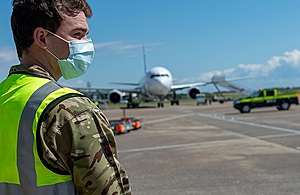UK Armed Forces Maintaining Critical Defence Activities
The UK Armed Forces are ensuring they keep the country safe, supporting the national response to Covid-19, continuing their critical operations at home and overseas, while ensuring they prepare for future tasks in a deliberate and disciplined manner.

The UK Armed Forces are ensuring they keep the country safe, supporting the national response to Covid-19. Crown Copyright
While some basic training and exercises were paused as a result of Covid-19, including the NATO exercises ‘Cold Response’ and ‘Defender 2020’, the Armed Forces have continued to fulfil non-discretionary activities:
- deployed roughly 4,000 troops, with a further 16,000 held at high readiness, as part of the Covid Support Force, which has helped with a significant number of tasks in the UK
- provided specialist support to the UK’s Overseas Territories, including the deployment of RFA ARGUS to the Caribbean
- conducted air strikes against Daesh terrorists in Iraq, on April 10 and April 28, in addition to routine armed reconnaissance flights
- deployed RAF Typhoons jets to the NATO air policing operation in Lithuania
- maintained the 24-7 Continuous At-sea Nuclear Deterrent
- patrolled UK and international airspace and waters monitoring Russian military activity
- continued critical operations in the Gulf, Iraq, Afghanistan and across Africa and Europe, alongside our international partners, NATO and the UN.
Maintaining all these operations requires a level of training to continue, ensuring both personnel and equipment remain ready to be deployed, both for scheduled operations and in case of unexpected tasks needed to guarantee national security.
In order to continue defending the nation over the longer term, the UK Armed Forces must also conduct routine force-generation, and is doing so in line with government guidelines.
This activity includes all types of training, including sea training for HMS QUEEN ELIZABETH, the UK’s future flagship aircraft carrier; basic and advanced flying training by the RAF; Royal Marine Commando training; Basic Training for Army recruits and Officer Cadet Training at the Royal Military Academy of Sandhurst.
Our Armed Forces are rightly classed as ‘key workers’ because they are tasked with keeping the nation safe. The health of our personnel and their families are also important, so this is being conducted in accordance with official guidance, and full activity will only resume following Government direction.
For the ongoing training, stringent protective measures are in place after specific planning processes and full risk assessments have been conducted, in accordance with Government and health guidance. The training is being configured and scaled in a deliberate and disciplined manner, enabling the military to continue its routine activities safely and while maintaining an infection rate below the national average.
Examples of steps taken to enable safe training include social distancing during roll calls and physical training, isolating at the beginning of courses and reconfiguring communal spaces such as canteens, sleeping quarters and classrooms.
Minister for the Armed Forces, James Heappey said:
It has been an enormous effort from people across the UK Armed Forces to reconfigure the training activity that simply cannot be stopped without impacting our national security in the months ahead. I am grateful to all of them for their hard work and ensuring essential training continues to happen safely.
There is a great deal of defence activity that will remain paused, which is entirely right, as we will always ensure the safety of our service personnel, their families and the communities that support them.